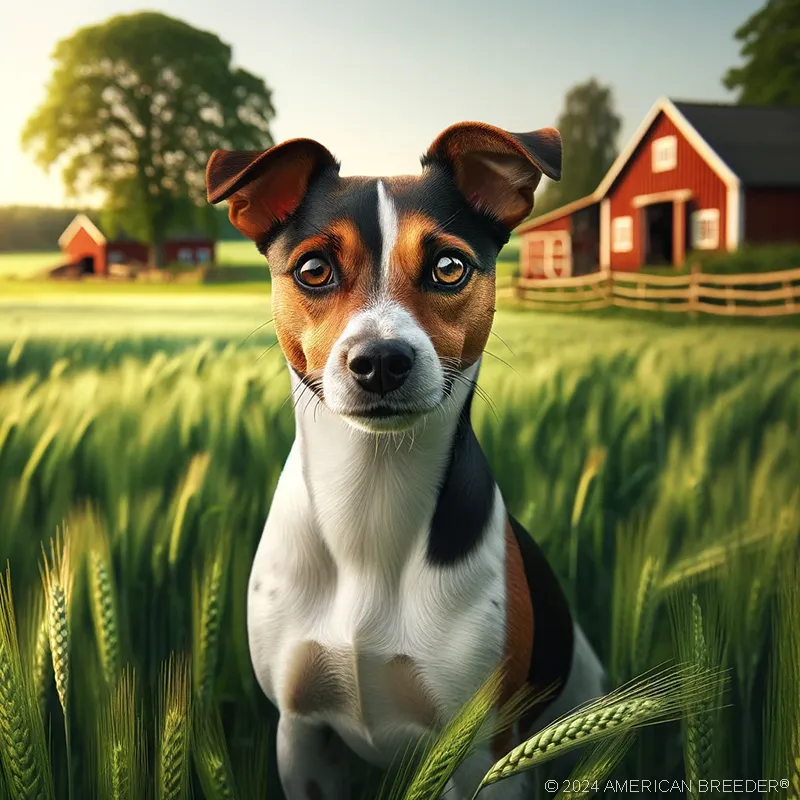The Heartwarming Bond with Your Danish-Swedish Farmdog
The Danish-Swedish Farmdog is a lively and charming breed known for its friendly and fun-loving nature. Before considering this breed, it's important to understand their energetic temperament and exercise requirements. Also referred to as the Dansk-Svensk Gårdshund or the Danish-Swedish Farm Dog, this breed has some interesting facts and nicknames worth exploring.
Breed Background and History
Originating in Denmark and Sweden, the Danish-Swedish Farmdog was developed in the late 19th century. These dogs were bred to be versatile working dogs, assisting farmers in various tasks such as herding, vermin control, and guarding. Although not widely recognized outside Scandinavia, they have a rich cultural history in their native countries. The Danish-Swedish Farmdog is classified and registered in the Foundation Stock Service (FSS) group by both the Fédération Cynologique Internationale (FCI) and the American Kennel Club (AKC).
Breed Characteristics
The Danish-Swedish Farmdog is a small to medium-sized breed, typically weighing between 15 to 25 pounds. They have a compact and muscular build, with a slightly rectangular body shape. Their coat is short and dense, providing protection from the elements. The breed comes in a variety of colors, including white with black or brown patches, and sometimes a mix of both.
Temperament and Personality
Known for their cheerful and outgoing nature, Danish-Swedish Farmdogs make delightful companions. They are sociable and friendly towards both family members and strangers alike. With a moderate energy level, they enjoy playtime and exercise but are also content to relax and cuddle with their loved ones. Their adaptable nature makes them suitable for different lifestyles and family dynamics.
The Danish-Swedish Farmdog is an intelligent breed that thrives on mental stimulation. They are quick learners and generally respond well to positive reinforcement-based training methods. With consistency and patience, they can excel in obedience training and even participate in various dog sports and activities.
Health and Care
Overall, the Danish-Swedish Farmdog is a healthy breed with few breed-specific health issues. They have a lifespan of around 12 to 15 years. Grooming requirements for this breed are relatively low, with occasional brushing to maintain their coat's health and cleanliness. Regular exercise is essential to keep them mentally and physically fit. A balanced diet and routine veterinary care are crucial for their overall well-being.
Socialization and Compatibility
Danish-Swedish Farmdogs are generally good with children and can get along well with other pets when properly socialized from a young age. Early and ongoing socialization is essential to ensure they grow up to be well-rounded and confident dogs. While they can adapt to multi-dog households, it's important to introduce new dogs gradually and provide each dog with individual attention and training.
Living Arrangements and Environment
Despite their working background, Danish-Swedish Farmdogs can adapt well to different living arrangements, including apartments, houses, or rural areas. However, they do require regular exercise and mental stimulation. Providing them with sufficient space to move around and play is important. They are adaptable to various climates but may require extra care during extreme temperatures.
Training and Obedience
Basic obedience training is essential for Danish-Swedish Farmdogs to ensure they become well-mannered members of the family. They are capable of learning advanced commands and may excel in activities such as agility, obedience trials, and tracking. As with any breed, consistent training and positive reinforcement techniques yield the best results.
Financial Planning
Before bringing a Danish-Swedish Farmdog into your home, it's important to consider the financial responsibilities. Initial costs may include adoption fees or purchase price, vaccinations, spaying/neutering, and microchipping. Ongoing expenses include food, grooming, veterinary care, training, toys, and supplies.
 Responsible Ownership and Ethical Considerations
Responsible Ownership and Ethical Considerations
When considering a Danish-Swedish Farmdog, responsible ownership should be a top priority. Adoption from shelters or rescues is a wonderful way to provide a loving home to a dog in need. If choosing to purchase from a breeder, thorough research and careful selection of reputable breeders are crucial to support ethical breeding practices and avoid puppy mills. By making responsible choices, you contribute to the overall welfare of these beloved dogs.
Legal Responsibilities and Regulations
As a dog owner, it's important to understand and comply with legal responsibilities and regulations. This includes licensing requirements, leash laws, and vaccination mandates. Familiarize yourself with local regulations to ensure you are meeting all legal obligations and providing a safe environment for your Danish-Swedish Farmdog.
Resources and Support
To provide the best care for your Danish-Swedish Farmdog, access to local resources is valuable. Identify trusted veterinarians, trainers, and grooming services in your area. Online communities, forums, and educational materials dedicated to the breed can provide additional support and information. Books, websites, and reputable sources are also excellent resources for further research and learning about the Danish-Swedish Farmdog.
Conclusion
In conclusion, the Danish-Swedish Farmdog is a delightful and lively breed that brings joy and companionship to any family. With their friendly temperament, adaptability, and intelligence, they make wonderful pets for active individuals or families. Remember to approach ownership responsibly, ensuring their physical and emotional needs are met. By providing a loving and suitable home, you'll enjoy a lifetime of happiness and cherished moments with your Danish-Swedish Farmdog.
Danish-Swedish Farmdog Quick Reference Guide
 Breed Background: Origin: Denmark, Sweden | Breed Purpose: Farm and Ratting | AKC Class: Foundation Stock Service | Year Recognized by AKC: Not yet recognized
Breed Background: Origin: Denmark, Sweden | Breed Purpose: Farm and Ratting | AKC Class: Foundation Stock Service | Year Recognized by AKC: Not yet recognized
Appearance: Size: Small | Weight: 12-18 lbs | Coat Type: Short, dense double coat | Colors & Patterns: White with black, brown, or yellow markings | Distinctive Features: Erect ears, bushy tail, agile build
Temperament: Energy Level: 4 | Loyalty: 5 | Friendliness to Pets: 3 | Friendliness to Strangers: 3 | Trainability: 4 | Playfulness: 4 | Frequent Barker: 2 | Chase Instincts: 4 | Sense of Smell: 4 | Drive to Hunt: 4
Health & Care: Health Issues: Generally healthy | Lifespan: 12-14 years | Grooming Difficulty: Low | Exercise Needs: Moderate to high
Socialization: Interaction with Children: Good, playful | Interaction with Pets: Generally friendly | Interaction with Strangers: Cautious | Elderly Compatibility: Yes | Ease of Training: Moderate
Suitable Living Arrangements: Apartment: Yes | House: Yes | Rural Area: Preferred | Yard Size Requirements: Small yard sufficient
Training & Obedience: Trainability: 3 | Intelligence: 4 | Obedience: 3 | Problem-Solving: 4 | Easily Stimulated: 4 | Focus Level: 3 | Easily Distracted: 3
Financial Planning: Typical Price Range: $500 - $1500 | Initial Expenses: Puppy essentials | Ongoing Annual Expenses: Food, vet visits
Breeding: Reproductive Maturity: 6-8 months | Litter Frequency: Once a year | Litter Size: 4-6 puppies | Stud Cost: Varies | Breeding Challenges: Finding suitable mates
Did You Enjoy this Article? Share it and Help Us Spread the Word!
If you found this article helpful, we'd appreciate it if you could share it with your friends or link to it from your website, blog, or group! You can also use the convenient social share tabs on the left side of the screen to instantly share this page to your social media feed. For more ways to support and promote the American Breeder Community, visit our Share & Promote Together page for social media posts and memes you can copy and share. Your support means the world to us!
Disclaimer: The information provided in this article is for general informational purposes only and does not constitute legal, medical, financial, or professional advice. While we strive for accuracy, we make no representations or warranties regarding the completeness, accuracy, reliability, or suitability of the information. Please consult with a professional before making decisions based on the content provided. American Breeder Inc. assumes no responsibility for any errors or omissions or for the results obtained from the use of this information.


